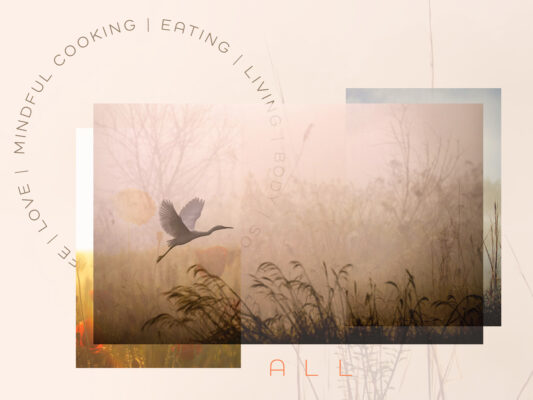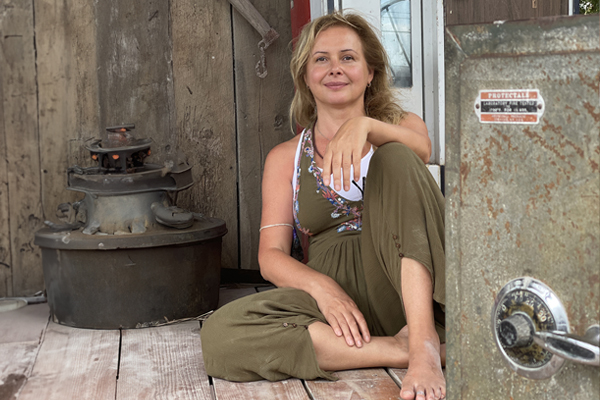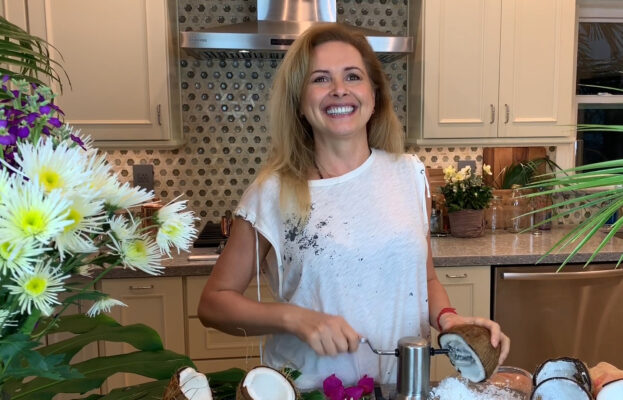While unfulfilled expectations, along with all the best-and-brightest moments of “There and Then,” seductively lure us into the abyss of cozy familiar, without much joy and sometimes with obvious annoyance, we exist in “Here and Now” as if it is an involuntary business trip. Why’s it so?
Why is being present so hard to achieve, yet everyone saying that being present is so important? Why is it that despite everyone preaching the importance of being present, it can be so difficult to stay in the moment? I know, even though I’m a certified Mindfulness meditation teacher, I’ve found it to be challenging many times. In this video, I’m talking about the topic of being present from my own personal experience and knowledge, exploring the reasons why it can be challenging in today’s fast-paced world.
From the constant distractions of technology to the allure of unfulfilled expectations, I’m sharing some of the obstacles that I’ve found prevent many from fully embracing the present moment. But I’m also talking about why being present is so important and the benefits it can have on our well-being. I’ll even answer questions like “what is being present” and “what does being present mean” to give you a better understanding of the concept. So come along with me as I share challenges and the rewards of truly being in the here and now. And hopefully, you’ll learn some strategies that can help you improve your ability to “be here now” too.
So, why is everyone saying that being present is so important, yet it is so hard to achieve? “Be here now”, “be present”, “be in the moment” – you hear it everywhere nowadays. But why? Why do many find it so difficult to stay here and now? And what does being present mean, exactly? No matter if it is painful or sweet, somehow it is so enticing to dwell anywhere but “here and now”, in the present, in this very moment. Why is it so?
You know, someone told me once that being present is like trying to hold onto a slippery fish. But you know what’s even harder? Being present when your phone is buzzing, your boss is yelling, your kids are crying, when you’re stuck in traffic or in a meeting that could have been a text or an email.
So here we are, why is it that despite everyone preaching the importance of being present, it is so not easy to stay in the moment? I know I’ve found it challenging to be present at times. But it is certainly possible, and there are ways to achieve that because it’s so worth it.
Listen
my rendition of ‘There and Then‘
The Grass is Greener There and Then
You know, the grass is greener on the other side. Everyone knows that. We’re flawless and powerful in the “Other Side” world, which is richer, brighter, and more vivid. And here we are – stuck in the past, in “yesterday”.
And somehow, this “yesterday” is soo attractive that often we move in there, gradually losing grasp on the reality of “Here and Now.” While unfulfilled expectations, along with all the best-and-brightest moments of “There and Then,” seductively lure us into the depth of cozy familiar, without much joy and sometimes with obvious annoyance, we exist in “Here and Now” as if it is an involuntary business trip. Let’s figure out why.

We had two literature teachers at the school where I worked a long while ago. It was apparent that one of the teachers was nearly appalled by the kids and consistently annoyed with us, her coworkers. The scene of the schoolyard filled with “screaming urchins” was a daily reminder to her that, despite finishing the most prestigious university, she didn’t become a famous author, a popular journalist, or a professor (all those things she aspired to be, you know), but just a middle school teacher.
She would often say, not just to us but to the children as well, that she would never be here if her life had turned out differently. And interestingly enough, at the moment of her saying it, her face would light up, and we all witnessed how for several seconds, she would immerse herself in her alternative, un-realized future, filled with accolades and admiration. But, as soon as she snapped back to reality, the disappointment and frustration would be written all over her face, and the difference between her dream and her reality would spill onto her students. Needless to say, she was no fun to be around, neither for us, her colleagues, nor the students.
The second teacher didn’t go to a fancy university. She loved literature immensely and was eager to share her passion with kids. She couldn’t wait to be surrounded by kids, so she got her first job at school while still in college. She shared once that her childhood dream was to become a teacher. As you would guess, kids adored her and loved her classes. While at school, she was light, enthusiastic, and inspiring. You see, the grasp of unfulfilled expectations had no power over her.

So, does it mean you’ll be happy if you do something you dreamt up in your childhood? I guess you never know… I’m not sure if I would be happy and fulfilled if I obtained my childhood dream job (at least not the first one I dreamt up). But, who knows…
It was Fall. I remember standing with my forehead pressed against the cool window’s glass, mesmerized by the movement of a beautiful large turkey-tale-like broom. The street cleaner was meticulously sweeping colorful fall leaves into precise large piles. Through my child’s eyes, the leaf piles seemed to be huge (at least double my height).
I watched the process with fascination. With each sound of the broom’s bristles shredding the ground, followed by the scrumptious sounds of rustling leaves, I was dissolving into the moment. I could feel it, I could smell it, I could taste it, I was in it, and I was it! I was a street cleaner, I was a broom, I was a leaf, I was a scent, I was the air! I was so happy! I declared then: “When I grow up, I’ll buy myself a beautiful broom and become a street sweeper!”

This dream lasted for a short while until, at the tender age of 5, I saw my first ballet performance in a spectacular Kyiv Opera House. The Neo-Renaissance palace-like grandeur of the 100-year-old theater took my breath away.
Everything from the coat-handling service and spiral marble staircase to the intricate spectator’s binoculars, from the mysterious luring melody of the squeaking ancient parquet floors to the etheric echo of the enormous embellished gilded ceilings, from the soft and ticklish feeling under my little fingers of the plush burgundy velvet loge trimmings to the cool and smooth carved wood arms of upholstered chairs enchanted me into a dream-like state.
And as the majestic grandeur began to vanish with the dimming of the light, I could taste the anticipation in the thick air, the anticipation of something unknown, yet unseen, but undoubtedly absolutely miraculous. And then, a big and powerful harmony of sounds exploded from the depth of the orchestra pit, filling up the space and taking my breath away. With the rise of the velvet curtain, the magical Art of Play was released as the white light poured out of the stage.
I was mesmerized by the clickety sounds of the point shoes on stage and was taken away by the experience, swaying, flying, and twirling away. I was a conductor, I was a ballerina and a ballet shoe, I was a violin and a drum, I was the air, I was the curtain, and I was the white light! Yet again, I dissolved into the experience. I was there, and I was more than happy. By the time of the standing ovation, I was ecstatic!
And I said to myself: “I must become a ballerina.”

You see, with new options to explore revealed to me, the fact that there are so many other ways to savor the fall and enjoy the smell and sound of fall leaves was apparent. My child’s mind moved on happily with no sadness or disappointment regarding my previous occupation choice, without lingering in the “There-and-Then.”
And just like that, later on, in the moments of complete and utter presence and involvement, I decided to become a vet, followed by a biologist, an experimental scientist, a zookeeper, a dentist, an eye surgeon, an animal defense lawyer, a teacher, and a delivery nurse. Well, I gave myself some options, you know. You see, my unfulfilled dreams and desires had no power over me.
And I bet, just like that, many people went through beautiful childhood experiences when they felt utterly present and connected with everything around them. So, I guess the question is, how come we move so much easier, without remorse or sadness, from one concept to another at a tender age? We’re soo open and curious, picking behind every open door and eagerly reaching toward new horizons, connecting with the world and seemingly expanding our identity.
But with age, we get more entangled and preoccupied with our perceived failures and successes, with what could have but didn’t happen; we’re getting lost in the web of our past experiences, expectations, and judgments while gradually disconnecting from the world we’re in.

Veiled by the mirage of “There-and-Then,” with its unrealized dreams and desires, so many human beings go through substantial stretches of their lives (if not whole lives), cursing life’s circumstances while feeling unfulfilled, incomplete, and unworthy.
The power of the past, the power of “There-and-Then,” the power of unrealized expectations manifests in seeing happiness somewhere out there in the past or perhaps in the future, but not right here in front of us, in the full potential of the present moment. So there is an idealized vision of events in our imagination, and only if both images (ideal and real) match, only then we feel that happiness is possible. And that is the recipe for disappointment.

The exuberance of present-moment experience defines the richness of life as it is here and now. Yet, how often do we let our thoughts, beliefs, and expectations about what we think we know keep us from seeing things just the way they are?
An enquiring “child’s mind” allows us to see the richness of the present moment and, in Mindfulness practice, is also referred to as the “beginner’s mind,” a mind that is willing to see everything as if for the first time, fresh and new.
No matter which activity you’re performing – whether it’s doing dishes, exercising, walking, engaging in formal meditation or yoga practices, cooking or eating, etc. – you can opt to engage our ever-exploring beginner’s mind to free yourself from expectations based on your past experiences.

A “beginner’s mind” enables us to remain open to new possibilities by releasing us from the realm of our own experience, which is inherently limited. We all, in one way or another, have experienced a tendency to think we know more than we actually do. Yet it’s so easy for us to see that there are no identical moments. Each moment is unique and unveils unique possibilities.
Life becomes an adventurous play if we embrace our beginner’s mind in everyday situations. So the next time you encounter someone you know, check in with yourself if you’re looking at this person with fresh eyes, not through your thoughts and perception. See those around you as they are in this particular moment, not as you think they would be. Try it with your friends, neighbors, or coworkers; you can take a good look at your pet or a plant if you have one. We can exercise our beginner’s mind in everyday challenges or employ it while leisurely enjoying the day.
Lifting the Veil
No matter what’s going on inside our heads,
the life around us is always on,
pulsating and evolving
in its brilliant,
never-ending play...
so what a joy it is
to be able to join the game,
to lift the veil of our preconceived notions,
and with each moment,
to rediscover water and air,
rocks and grass,
to sway with the branches of the trees,
to dissolve into the softness of a cloud,
to lose ourselves in the endless sky,
to sparkle like a star…
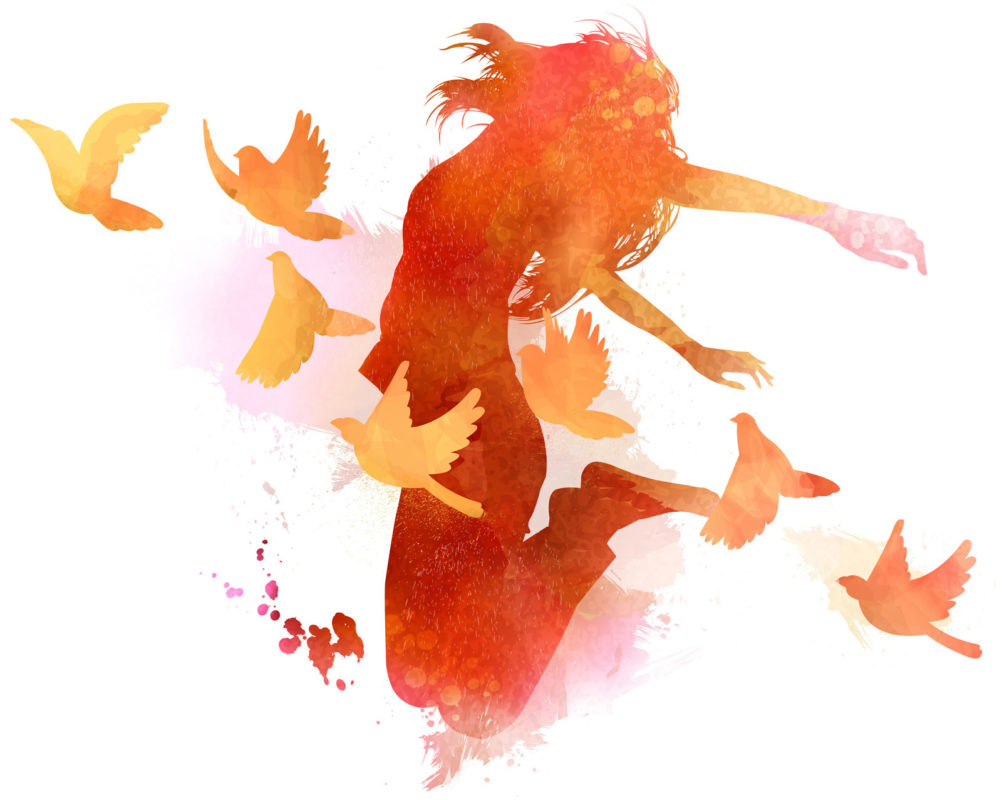
The challenge may arise when we start paying attention to our moment-to-moment experience and our mind tends to get straight to work, labeling and categorizing almost everything we perceive. Just when you start paying attention, your brain begins its judging and sorting function – good or bad, beautiful or ugly, appropriate or shameful.
When I recognize this essential judging quality of the mind as it emerges, it presents me with an opportunity to take a broader view by suspending judgment and, to the best of my ability, impartially observing what’s happening (including my reactions to it).
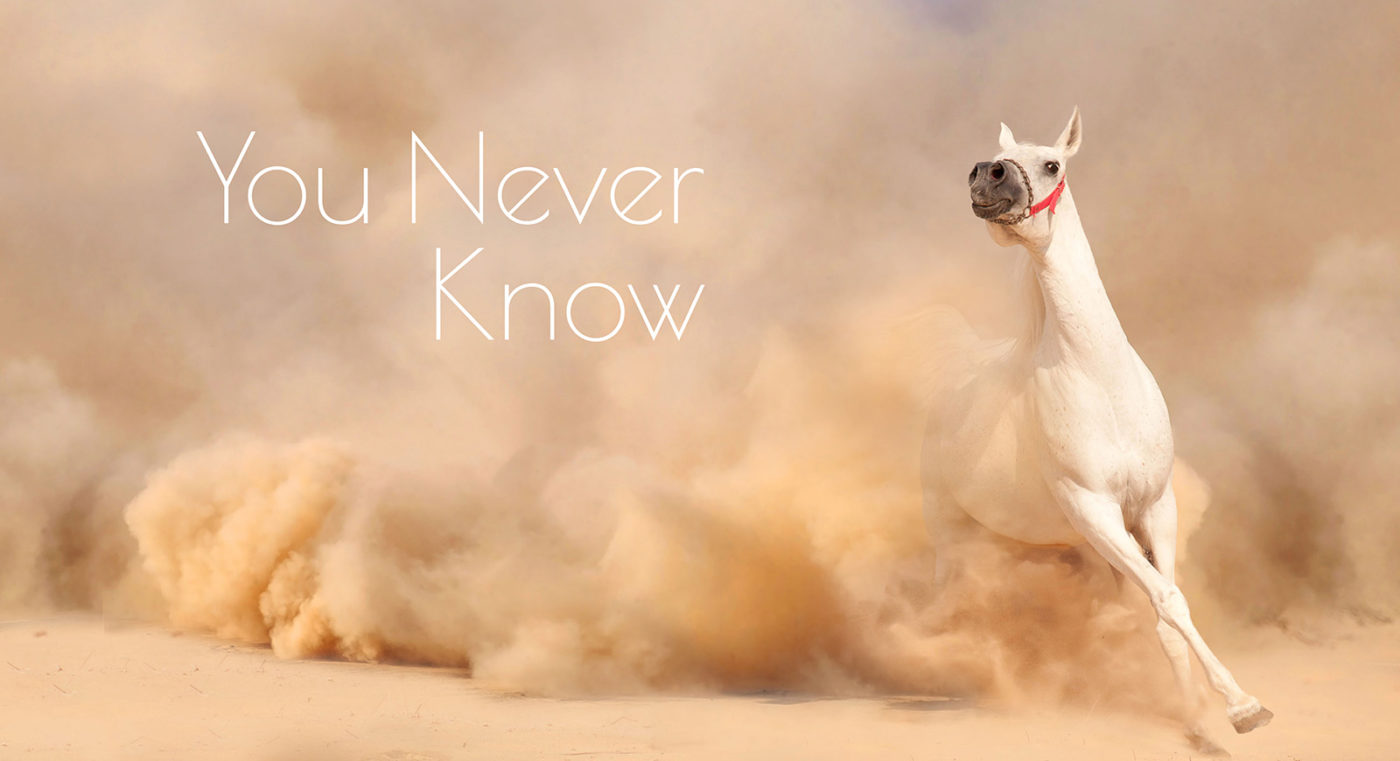
You Never Know or The Man Who Lost His Horse
In a small, far-away village lived an older man. He was a farmer with not much to show for himself, but he had a stunning white horse. He loved this horse very much and took good care of it. A lot of people attempted to buy this horse and offered an obscene amount of money to the farmer, but even though he was dirt-poor, he rejected all the offers, no matter how large the amount was. Nothing could replace the bond between the farmer and his horse.
One day he discovered that the horse was missing from the stall. The news spread fast, and the neighbors came:
“You old fool! You don’t even have a lock on your barn; we knew you would lose your horse one day. You should’ve sold it when you could. Now you’re left with nothing. What a misfortune!” – they said
“You never know,” – the farmer replied – “You never know.”
People laughed at the farmer. But a few days later, at night, the horse returned, and not alone, but with company. He brought a dozen horses with him. Again people gathered.
“The old man was right. It wasn’t a misfortune. It is clear now that this is a blessing.” – they said.
“You never know,” – the farmer replied
This time people didn’t say much, “Yea right,”- they thought-“Lucky old fool.”
The next day the farmer’s only son tried taming one of the new horses and fell down, breaking his leg. And all the neighbors came around and said:
“Well, that’s too bad; in your old age, your son is the only support you got. So what’re you going to do now? This is a real misfortune!”
“You never know,” – the farmer replied -“You never know.”
Next thing you know, the war had begun. Recruiters came to the village, and all able men were drafted. Only the farmer’s son was spared because of his broken leg. After saying goodbye to their loved ones, villagers were crying in despair as they passed the humble dwelling and saw the farmer sitting in front of it with his son.
“You were right, old man; now it is obvious how fortunate you are. Your son is not much help, but he is still with you. Our sons and husbands are gone and might be forever.”
The farmer looked at them and said, nodding his head: “You never know, You never know.”
And so the story goes.
Taoist parable called Sāi Wēng Lost His Horse

Wouldn’t it be nice to be able to suspend all judgments and accept each moment as it is, without categorizing it as good or bad, fortunate or unfortunate?
Meditation entails adopting a non-judgmental attitude toward whatever arises in the mind. It is an essential part of meditation. But does that imply there won’t be any judgment? Of course not, since it is the nature of the mind to compare, evaluate and assess. But when it happens, we don’t try to stop it or dismiss it in any way.
In meditation, we just observe and identify whatever arises in the mind or body without judging or pursuing it, recognizing that our judgments are inescapable and inherently limiting notions about reality.
A non-judgmental attitude does not imply that you are incapable of acting or behaving appropriately. Just because you don’t pass judgment on others doesn’t mean you’re accepting of anyone’s bad behavior or that you don’t care about the consequences of your own actions.
This implies seeing that our perception is distorted by our thoughts and actions because they’re being filtered through a sea of unconscious likes and dislikes. This understanding allows us to operate with much better clarity and bring more efficiency and balance into daily life, setting the stage for the greater experience of the present moment. The best way to liberate yourself from the power of There and Then is to capture the moment by paying attention and being here now.
The present moment is the only time that each of us will ever have. Our relationship with things changes when we pay close attention to our moment-to-moment experience because This Moment is the only time when we can do anything, anything at all. Only in the present moment can we acknowledge and perceive, learn and change, heal, love and live.

Be Alive 🌱,
❤ Love, Julia





